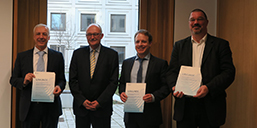Why do couples decide to have children? How do family structures change and what does this mean for relationships, family ties or the cohesion of the generations? In order to a better understanding of these and other questions of family and demographic development, research based on solid data and innovative methods is necessary. To this end, the starting signal has now been given for a new family demographic data infrastructure, which is being funded by the Federal Ministry of Education and Research (BMBF) and the Federal Ministry of the Interior, Building and Homeland Affairs (BMI).
In an official act yesterday, Dr. Meister, Parliamentary State Secretary of the BMBF, handed over the funding decisions to the representatives of the three consortium partners BiB, GESIS and the University of Cologne. The study "FReDA - The Family Demographic Panel" is being jointly developed by the Federal Institute for Population Research (BiB), the Leibniz Institute for Social Sciences GESIS and the University of Cologne. At the core of this data collection are annual repeat surveys of 18- to 49-year-old women and men in a representative sample. The findings for Germany can be systematically compared with other countries.
The BMBF and the BMI are jointly funding this major scientific project. The BMBF is providing start-up funding of 12.5 million euros until 2024. If the evaluation is positive, the BMI will ensure that the data are made available to science, the public and politics free of charge.
Got to BMBF's press release: http://ow.ly/aJ7v50y0x4O

